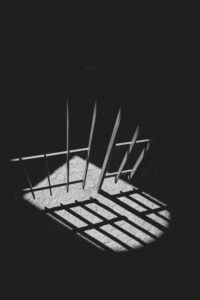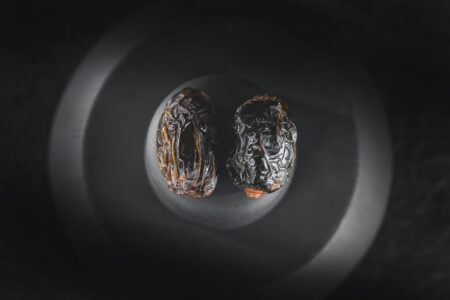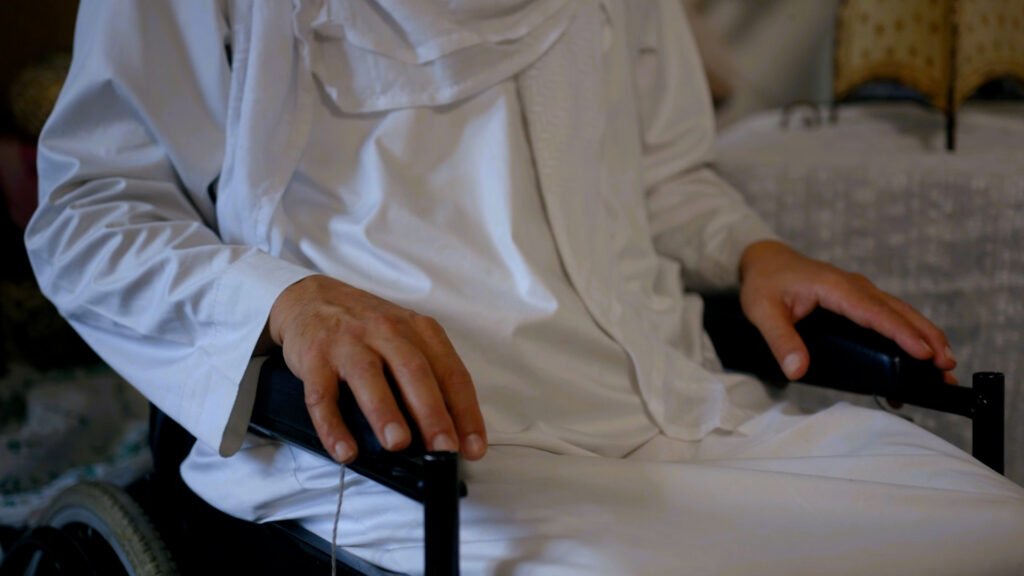When wheelchair bound polio sufferer Ayub came to the UK from Algeria, he thought his years of struggle were behind him. But his hopes of security and dignity were shortlived.
After a few happy years pursuing his education and building a family, he was thrown into a nightmare of detention without trial, legal limbo, house arrest and later fighting deportation where he could face further torture. After years of living in deep despair, he found HHUGS, the only solace and relief for his family.
A New Beginning
I came to the UK in 1995, as an asylum seeker, fleeing from the conflict in Algeria. It is a date I can never forget
I had a normal life at that time. I was going to college, learning English, and continuing my studies in Mathematics. Alhamdulillah, three years after I arrived, I got married and was blessed with a beautiful daughter. We lived together with respect and love.
At that time, I was dreaming; I thought Britain was somewhere where I would have dignity; where my human rights would be respected. I thought I would leave the difficulties I had faced in Algeria behind, that the British would help me, as I am disabled.
I have suffered from polio since I was 2 years old. Wallahi, it is a very difficult condition. It is very severe. Since I came to the UK, I have been in a wheelchair. I experience pain in my legs, joints, neck. It has affected my daily life. I cannot do things normal people do – whether playing sports, or normal activities at home. My wife had to do everything for me – cooking, washing my clothes, if I go to the toilet, for example, she will help me to get from the wheelchair to the toilet seat. If I want to take a shower, she would have to assist me. She was always with me. Living with polio, you need someone with you, every day, every minute, every hour, helping you with the most basic activities. Despite this, I tried to remain active and contribute to the local community, whether by giving the adhan in the mosque, or teaching Qur’an and Arabic to the children there.
The dawn that devastated our lives
In 2001, following September 11th, our lives were changed forever.
We woke to banging at the door, as 20 officers, from the police, the Home Office and security services, raided my home.

They didn’t ask me any questions. I was just told that I was a “risk to the public” and that I was being arrested under the Terrorism Act 2001. I didn’t know that there was a law at that time that you can be taken straight to prison. Later on, I found out anyone can be arrested and held with no charge, no trial; neither you nor your solicitor can see the evidence against you. This secret evidence can only be discussed between the Home Office and the judge only.
There were no words to describe the scene. I remember my wife screaming, my daughter shouting. She was trying to calm my daughter, as she was screaming, but the officers were very aggressive to her, shouting at her to “just sit there, don’t talk”. She didn’t react. They were both just crying, as the officers physically searched them, and then proceeded to search the house. I had no clue what was going on. It was all very shocking. I didn’t expect that the British police or security services would treat us like this.
“They didn’t allow me to talk to my wife or daughter. I thought, as a human being, you are allowed to hug your wife, or daughter, if you are going to prison. I wanted to touch my daughter, to hug her, but they didn’t allow me. It was very depressing.”

They didn’t give me time to breathe. They rushed me outside, where there was a big scene – 3 large vans, 2 police cars – despite me being in a wheelchair. I asked, can you tell me where I am going? Can you tell me which prison, so my wife and daughter can visit me? What is the evidence, the allegations against me? Can I call my solicitor? But they said they cannot tell me for security reasons. They were just aggressive, telling me to shut up, that I was not allowed to call my solicitor.
When people see this kind of raid, they will naturally start to be scared. They will doubt you, even if you are innocent. The law normally here is that you are innocent until you are proven guilty. But in my case, it was as if we were guilty before we were proven innocent.
So the people who were very close to my wife and I became distant. They cut any relation with us. They thought, as we are under investigation, as the security services and the Home Office are watching us, that they cannot help or approach us. As a result, we have been isolated for many years. We are still suffering the side effects, until now, because of what happened twenty years ago.
I was worried for my daughter, because she was so young, I knew my wife could not look after her alone. Children need both a father and mother with them. Even if I could not physically support her, there were things that I could do as a father – moral support, talking to her, hugging her, caring for her – but I was banned from all of this. Even though now she is 22 years old and married, she still suffers the side effects. She still remembers how the police came, how she was screaming, how she lived for five years without a father.
“Britain’s Guantanamo”
I was taken to Belmarsh, a high security prison, and held in the segregation unit. It was a prison within a prison, where they used to hold the Irish.
It was very restricted. You cannot see the sky. You cannot breathe fresh air. Unlike other prisons where you are allowed to go to the chapel at least on Friday for an hour, we were banned from Friday prayer. We had only one hour for association. The rest of the time, 23 hours a day, I was in my cell.
But in my cell, I could do nothing. I was in the wheelchair, sitting in this single small cell. There was just a sink where you can wash your hands, a toilet, a small bed, and that’s all. You were not allowed to have anything, any book to read. I lived in that cell for four years.
Even animals have rights, but we were treated less than animals.
I didn’t expect to be in that unit for years.
It was a nightmare. I swear, by Allah, it was like a second Guantanamo, but a hidden, secret Guantanamo.
The staff were Islamophobic. They had no mercy. One day, I was pushed physically, but when you talk to your solicitor, there is no evidence you can present to substantiate it. There was no CCTV – or if there was some CCTV in one area, they will say it was switched off.

I developed serious depression. I was put on medication, but it was very difficult to get treatment. If you press the button, telling the officers, “I am sick, please can you call a doctor for me, or a nurse?” They will not respond. The officer will say “one hour”. Sometimes he will ignore you until the next day. Sometimes he will ignore you completely. And you cannot complain – I tried to complain about many issues, but they did not take any action. It was very hard for me to get medication for my physical and mental health. It was challenging. I had to fight for everything. For everything, you had to scream, to shout, it was a struggle, big struggle.
You just go around in circles without any solution. You are just killing yourself, adding stress to yourself. I can’t describe how horrible it was.
“It destroyed my life. I remember one day I said to myself, “I just need to finish this. I have no hope of being released. The law said it’s indefinite detention. I cannot even fight my case. I need to end my life, because I have no hope to come out of prison.” I know, as a Muslim, I cannot kill myself, but at that time, I was not functioning properly.”
I tried to hang myself. I nearly took my soul.
Lives in Limbo
Nearly one year passed before I saw my wife again. The first visit wasn’t face to face. My wife and daughter were behind a glass screen, and we both had phones to communicate. The officer was sitting listening to everything. I could not say anything. Unlike a regular prison visit, I couldn’t touch my daughter or hug my wife, or even sit at a table with them. It was a disaster. This caused me more depression and anxiety.
I was very worried about how my wife was coping without me. In our first visit she told me that no one was helping her; all of her friends had cut her off. She was struggling financially. My benefit had been cut off. Coming to visit me was also a struggle. It was a long journey to visit me in Belmarsh, and no one could drop her off by car so she had to take the train and the bus. It was a struggle for her and my daughter.
When your wife cannot see you, when you cannot help her, you cannot be with her or your daughter, at home, your relationship starts to change. I remember my wife would ask me, ‘how long will you stay there? Did they charge you or not? Is there court, a trial or not?’ I would say, ‘there is no charge. There is no court, there is no evidence against us.’ So she would ask, ‘how long will I wait for you? How long will I be patient?’ She is a human being. So a gap started to develop, and increased little by little, because of the restrictions. I felt her patience run out. One visit she said to me, my patience is finished, I am finished, I cannot hold it, I cannot carry on like that. Because I was stuck inside. Then the visits were reduced to once every 2 weeks, then once a month, then once every two months, and there was no one to bring her. It was nightmare for her and the gap started to become bigger and bigger.
“I remember many Ramadhans spent with my wife and kids. We would fast together, break fast together. It was a lovely time with them. We would go to the mosque for tarawih, but in prison, wallahi, what kind of Ramadhan was it? Ramadhan was a nightmare inside the prison.”

I spent Ramadhan in my cell. No prayer. Our tarawih inside a single cell. I could not enjoy the time with my wife as before. I could not enjoy Ramadhan.
My wife felt the same. I was in a real prison, but for my wife, it was a prison too, because no one was helping her. She spent her Ramadhan alone. She broke her fast by herself. She was very isolated. No one was giving her moral or physical support. She too experienced mental stress. It was a nightmare for her.
I spent four years in prison without trial. All of this is what pushed me to end my life. In the UK, you assume there is democracy and justice. A normal prisoner has a chance to go to court, the evidence is in front of you, a solicitor can defend you – but it was completely different for us. I didn’t know the evidence against me, I didn’t have a trial. The solicitor could do nothing as they could not see the evidence against me. I didn’t expect this from the Britain I sought asylum in, amongst whom I was seeking shelter, running from a dictatorship.
When I came to the UK, I thought I will find a paradise here. But it wasn’t paradise for me. It was hell for me, and for my wife. Wallahi, I cannot describe what I went through.
